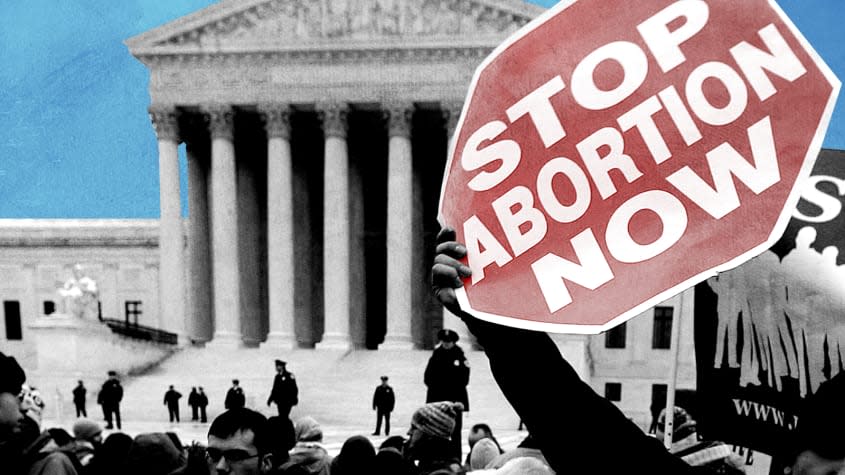What pro-life activists are saying in the wake of the Roe v. Wade bombshell

On Monday, Politico published a leaked Supreme Court draft opinion that would strike down Roe v. Wade, the 1973 decision that created a federal constitutional right to abortion. Here's what it could mean for the future of the Republican Party and the pro-life movement:
1. Give peace a chance?
By returning the abortion issue to the states, the decision could bring some degree of détente to the contentious debate, suggested Jacob Sullum at Reason last year. "Without Roe, political battles over abortion will continue, but they will mainly involve state-by-state legislative debates rather than arguments about constitutional law and the composition of the Supreme Court," he predicted. "While neither side will be happy with that situation, it will reduce the stakes of any given legislative or judicial decision and turn down the heat of a controversy that has frequently dominated national politics."
Rod Dreher of The American Conservative concurred. "Most European countries allow abortion, but restrict it to the first trimester, absent certain exceptions that have to be approved by more than one doctor. No European country is as liberal as the U.S. is on abortion. If SCOTUS overturns Roe, then the U.S. will become like Europe in this respect," he wrote.
2. Scorched Earth
Others argued that opening the door to abortion bans at the state and federal level will only add fuel to the fire. In his book Divided We Fall, David French imagined a worst-case scenario "where rage at a Roe reversal [creates] irresistible momentum for court-packing, and state resistance to the packed court [fractures] the nation."
In The Bulwark, Charlie Sykes stopped short of forecasting a full-scale secession crisis, but he still painted a bleak picture of post-Roe politics. "I imagine it playing out like this: J.D. Vance comes out for a ban after six weeks; Josh Mandel calls for a ban after two weeks; [Marjorie Taylor Greene] declares that all true conservatives support a total ban; and Madison Cawthorn insists that the true pro-life position demands the death penalty for doctors who perform the procedure," he wrote.
"Every legislative and governor's race now becomes a referendum on abortion," Sykes further predicted. "Every congressional and Senate race will be a referendum on abortion. The 2024 presidential race will be a referendum on abortion."
His theory will be put to the test in the November midterms, but opinion remains divided on how exactly the decision will affect those elections. "Does this motivate married suburban women for the Democrats five months post-decision against a backdrop of war in Europe, high gas prices, education issues, and rampant illegal immigration? I don't think so," a former GOP Senate aide told The Washington Post, adding that the decision could further motivate the already enthusiastic conservative base.
Also speaking to the Post, Democratic strategist Richard Luchette disagreed. "Stopping [former President Donald Trump's] re-election became the single biggest reason Democrats turned out in 2020, and [the Supreme Court decision] will have similar impact on the midterms," he suggested. Attorney and Democratic pundit Ron Filipkowski took a similar view, arguing that the "effort to overturn Roe has been a powerful fundraising and voter-turnout vehicle for GOP candidates for 50 years" and that without it, "the energy and focus now flips to the Democrats."
3. Next steps
Pro-life organizations are already working to capitalize on the momentum, however, arguing that this is not the time to take the foot off the anti-abortion gas pedal. "It's not enough to send abortion back to the states. Democracies shouldn't have the ability to vote on if a genocide can be committed against an entire group of people," wrote Lila Rose, the founder of the pro-life organization Live Action, adding: "We are just getting started in our defense of human life. We must be in every statehouse, the halls of Congress, and we will even be back to the Supreme Court to advocate for our preborn brothers and sisters."
But it's still an uphill battle to a federal abortion ban, noted Caroline Kitchener, who covers abortion for The Washington Post. "[A] strict nationwide ban would be extremely difficult to pass, requiring 60 votes in the Senate and a Republican president," she tweeted. "But anti-abortion leaders are eyeing the midterms and 2024 — and they'll be using these kinds of proposals as a rallying cry." She added that "there is still some debate among anti-abortion/GOP leaders about which national cap would be best: Six or 15 weeks. Activists say they'll use the midterms as a test run, watching how each type of proposal plays with voters."
The Susan B. Anthony List, which supports pro-life politicians, tweeted its plan for a post-Roe America, explaining that the organization will to work to "build consensus for the strongest protections possible for unborn children and women in every legislature" while also recognizing "the need for the pro-life movement to continue its existing work to support pregnant women and children in need."
After Roe falls, part of the pro-life movement's ongoing fight will be against left-leaning corporations eager to punish states that restrict abortion, Ethics and Public Policy Center President Ryan T. Anderson predicted last year. "Remember when corporate [A]merica did to Indiana over [the Religious Freedom Restoration Act]? Or North Carolina on [transgender] bathrooms? Or a host of states on transgender 'medicine' and sports? Expect to see them attempt to do the same to pro-life states in a post-Roe world," he wrote.
You may also like
Texas Gov. Abbott's border inspections prompt Mexico to move lucrative trade link to New Mexico
John Oliver explores the deliberate causes and tragic costs of environmental racism

